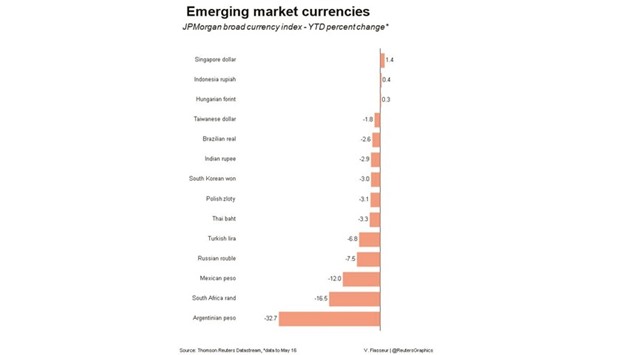Emerging stocks fell to the lowest level in nearly three weeks yesterday and Polish zloty volatility jumped to three-year highs as Brexit prospects drove investors towards safer assets including the dollar.
MSCI’s emerging market index slipped 0.8% in its fourth straight day of losses with the index provider’s eastern European benchmark tumbling 2.6%, bringing this week’s losses to nearly 4%.
Investors’ nerves frayed after two polls showed rising support for Britain’s “Leave” campaign ahead of the June 23 referendum on membership of the European Union.
Meanwhile the US Federal Reserve was scheduled to start a two-day meeting on interest rate policy.
The dollar index is up almost half a per cent while German 10-year yields turned negative for the first time.”Markets are becoming increasingly nervous about Brexit and in the short-term we will continue to see this kind of trading,” said Luis Costa, head of CEEMEA FX and debt at Citi.”In European equities, in Bunds, spreads in peripheral Europe and in central Europe we have had big moves - at this time people will look to square positions rather than add.” Eastern European assets bore the brunt of the falls.
Bourses in Poland and Hungary both dropped 1.3% while Polish bond yields shot to multi-month highs and the zloty traded at its weakest in three weeks.
Zloty implied volatility, a gauge of expected swings in the currency, against the euro hit its highest in three years while Hungarian forint volatility surged to the highest since October.
Around 1.5mn Eastern Europeans, especially Poles, live in Britain and the region has the most direct economic links not only straight to the UK but also via the eurozone, which could be hit hard by a Brexit.
Poland, central Europe’s biggest market, will likely be hardest hit, with currency traders seeing little support for the zloty after central banker Jerzy Kropiwnicki signalled unwillingness to intervene until the zloty fell to 5 per euro.
It currently trades around 4.42 per euro.
The rising dollar and domestic woes dragged down currencies elsewhere too.
Russia’s rouble fell 0.8% to its weakest in almost two weeks against the greenback as oil prices slipped.
South Africa’s rand tumbled 1.1% after data showed the current account deficit widened in the first quarter of 2016 as exports slumped despite a recovery in the global prices of commodities and a weaker rand.
In Turkey, the lira weakened 0.6% as a top aide to Turkish President Tayyip Erdogan said he expected the central bank to cut interest rates further this month and shrugged off concerns about inflation.
Investors were also awaiting index provider MSCI’s decision on its latest rejig due later in the day.
MSCI is expected to announce on whether to include China A-shares as well as Pakistan and Saudi Arabia stocks in its emerging market benchmark.
Meanwhile Peru could see its bourse reclassified from the emerging to the frontier benchmark. Chinese mainland shares closed marginally higher.

..
